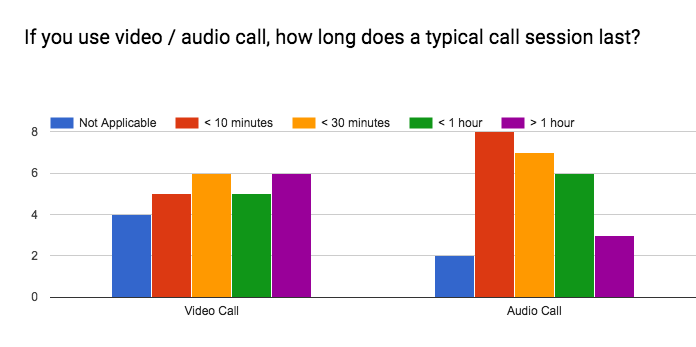Who Has The Time?
Mixed Methods for Formative Research.


Personal Communication Across Time Zones
As part of a graduate course in Human-Computer Interaction, my team and I performed a formative study to investigate how users leverage communication technology to cope with the unique challenges posed by residential moves across time zones. We distributed an online questionnaire (N=26), the results of which we used to develop a semi-structured interview (N=10). We coded and analysed interview results using a grounded theory methodology.
Prior studies of cross-time-zone communication at CHI and CSCW focused mainly on collaboration with remote co-workers, not with family members. Studies that focused on family members did not capture recent changes in technology use, such as the rise of group chats. Many of our interviewees reported making use of group chats to stay in touch with family and friends, across a wide range of technologies.
Some highlights from the semi-structured interviews are presented in the table below.
Contributions: Concept, Experiments (one third of interviews), Analysis, Report Writing. This work was completed with two other graduate students, John Kanji and Harris Chan.
| Partic. No. | Previous Location | Previous Time Zone | Occupation | Example of ICT use for communicating across time zones |
| P1 | Oregon, United States | (EST - 3) | GS (M.Sc.), Computer Science | Has a nightly group chat (both text and audio) with 4 close friends. |
| P2 | Netherlands | (EST + 6) | GS (Ph.D), Neuroscience | Reports gradually decreasing communication in the months following their residential move. |
| P3 | Germany | (EST + 6) | US, Computer Science | Uses multi-person audio call to chat with their friends while multitasking (gaming). |
| P4 | Iran | (EST + 7.5) | GS (Ph.D), Civil Engineering | Uses group chats to share their experience as a newcomer to Canada. |
| P5 | Alberta, Canada | (EST - 2) | Medical Student | Uses time difference to make an emergency call late at night. |
| P6 | British Columbia, Canada | (EST - 3) | GS (M.Sc.), Aerospace Engineering | Calls parents using cellphone as they walks home from class. |
| P7 | Switzerland | (EST + 6) | US, Biomedical Engineering | Uses video calls with long distance relationship partner |
| P8 | British Columbia, Canada | (EST - 3) | US, Engineering Science (Robotics) | Uses group chats to keep in touch with high school friends, and used video calls for special occasions such as birthday surprises. |
| P9 | Colorado, United States | (EST - 2) | GS (Ph.D), Computer Science | Uses Skype to call parents every day after returning from work at 1 am. |
| P1 | United Arab Emirates | (GST + 8) | US, Life Science | Shares jokes and memes in group chat. |
 Go to portfolio.
Go to portfolio.